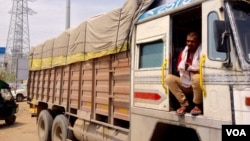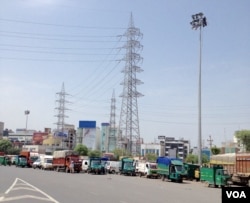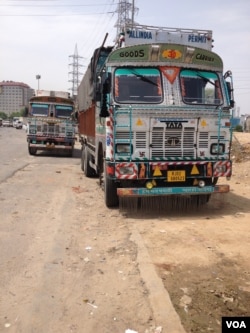As the hot sun beats down, truck driver Babloo Yadav waits at a border checkpoint in Haryana state for an official to check papers for the truckload of cement he is ferrying. The 350 kilometer trip from Rajasthan to Delhi via Haryana should take no more than eight or nine hours, but long halts at state borders add many tiresome hours to the journey.
The delay stems from the confusing mesh of separate taxes and duties levied by India’s 29 states. “When I present my papers they deliberately find some fault,” said Yadav, “And they take up to $75.”
Shelling out bribes is only part of the problem. It is estimated that truck drivers, who transport two thirds of freight across the country, spend only half their journey traveling – traffic snarls and a gigantic bureaucracy plodding laboriously through paperwork at state checkpoints consumes the rest.
Ambitious ‘game changer’
An ambitious tax reform measure that aims to turn India into a seamless common market could end such woes. Called the most important reform since India liberalized its economy a quarter century ago, the Goods and Services Tax (GST), once it is passed by parliament, is expected to boost manufacturing and exports and make it much simpler to do business by cutting India’s notorious red tape.
“It’s definitely a game changer. It will make compliance of tax for the private sector much easier,” said D.K. Srivastava, a former professor at the National Institute of Public Finance and Policy. “Inefficiencies that are there because of fiscal barriers will all be eliminated.”
After being debated for nearly ten years, the measure could finally see the light of day as the government expresses optimism about breaking a longstanding political deadlock.
For Prime Minister Narendra Modi, who has vowed to improve India’s tough business environment, passing the GST has been top priority. But getting state governments and the main opposition Congress party on board has been tough. Although the bill was passed by the lower house a year and a half ago it has been stuck in the upper house of parliament, where the government lacks a majority,
The ruling Bharatiya Janata Party (BJP) is optimistic that is has built a political consensus and the measure will be approved in the current parliament session.
Manufacturing boost
The hope is that the measure will boost the manufacturing sector at a time when the government is pushing a “Make in India” campaign to woo foreign investors to set up factories in India. The goal: turn the country into a manufacturing hub as costs rise in China, creating much-needed jobs in India.
According to estimates, by improving business efficiencies, the good and services tax could add 1.7 percent to an economy that is already powering ahead.
However economists warn that India may not see such sweeping benefits in the short run because the bill has undergone many modifications in a bid to make it politically palatable.
“It’s a very fragmented GST that is likely to be ushered in,” said Srivastava. But he adds the benefits will flow gradually. “It would set up a platform for moving to the purer form of GST later.”
The measure is eagerly awaited by traders, manufacturers and transporters.
Calling the movement of cargo a huge logistical challenge in India, co-founder of Caravan Roadways, Rajeev N. Gupta, said GST could significantly reduce the time for transporting freight.
“It will clean up all the mess,” he said. But he said that is contingent on what shape the reform actually takes. “We need to see how well those speed breakers and hindrances are removed by the GST.”
Observers say the hurdles being encountered in passing GST underline the massive political challenge of ushering in reforms in India. When it was championed by the Congress Party government some years ago, the BJP, then the principal opposition, opposed the measure. This time it has been held up due to strident objections from the Congress Party, which now occupies the opposition benches and which still has not committed its support.












